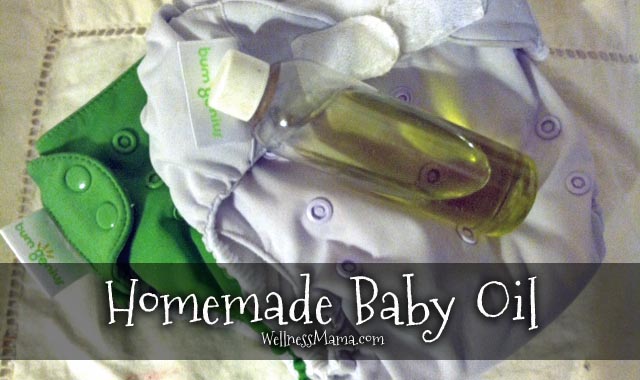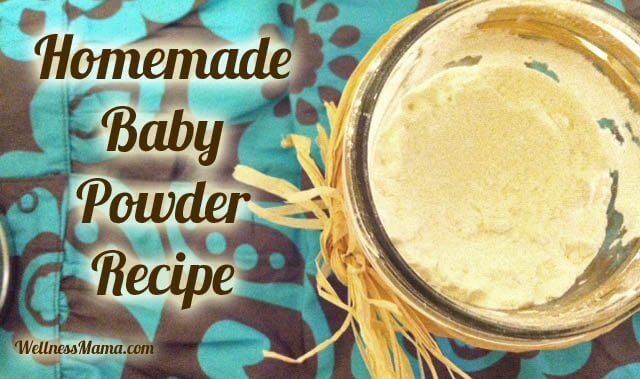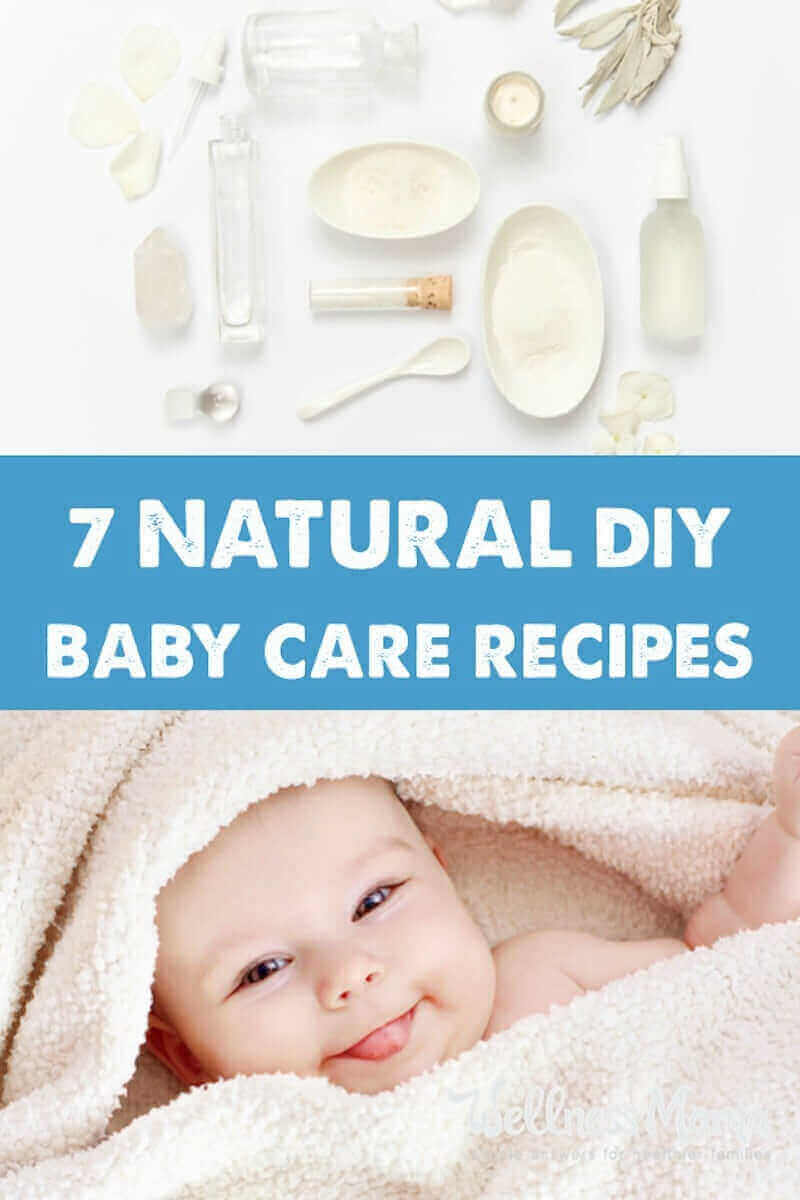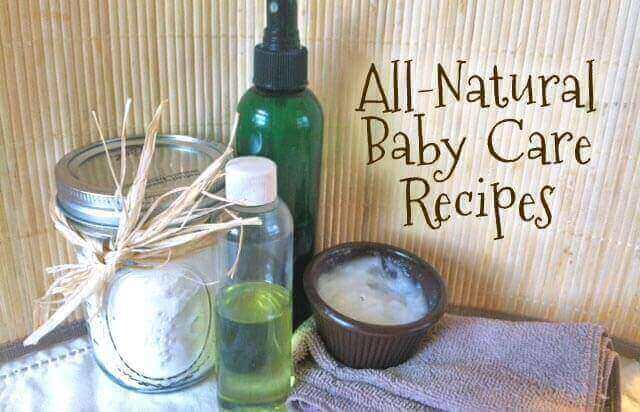I love using natural products for all of my personal care, cleaning and household needs, but if you’re not ready to jump on the DIY deodorant and toothpaste bandwagon just yet, at least consider using all natural products on your kids!
Most kids are exposed to a scary number of chemicals on a daily basis, and even babies are born with chemicals in their umbilical blood. Most baby products and shampoos contain chemicals and many are not actually safe for baby. For example, many baby shampoos (including J&J) have some of the worst chemical ratings and baby oil is just liquid petroleum oil with some added (artificial) fragrances.
A baby or child’s perfectly soft skin absorbs almost anything put on it, so natural options are really important! There are a few companies who make natural baby care options, but the cheapest, easiest and most natural way is just to make your own. Actually, you can just use pure coconut oil for everything from cleaning to moisturizing to treating diaper rash, but if you’d prefer a little variation, check out these recipes!
These are the recipes I use on my own kids and give to friends when they have babies.
Natural Diaper Cream-Cloth Diaper Safe!
UPDATE: I’ve created an updated version of this diaper cream that is even more effective and you can find the recipe here.
We started cloth diapering with our third child and I will never go back! Not only is it much cheaper, but it is more natural and much easier than I expected after hearing horror stories from my mother-in-law about the old-school cloth diapers. Thanks to cloth diapers and better nutrition my babies very rarely get diaper rash, but for the occasional time when a baby poops during the night and doesn’t wake up until morning or gets a rash while in the car seat on a trip, it can be a little tougher with cloth diapers.
Commercial diaper cream should never be used with cloth diapers since the fish oil in it will leave a fishy smell no matter how much you wash the diapers. It will also void any warranty on the cloth diapers. After much research and some trial and error, I finally created a diaper cream that is cloth diaper safe and that works as well as the medicated versions.
It can be used directly with cloth diapers if you don’t mind stripping the diapers after using them, but I prefer just to line the diaper with a piece of an old t-shirt when I’m using diaper cream to avoid the extra laundry hassle.
Diaper Cream Ingredients
- 1/2 cup coconut oil
- 1 tablespoon calendula flowers
- 1 tablespoon chamomile flowers
- 1/4 cup shea butter
- Optional: 1 tsp arrowroot or zinc oxide powder or more to thicken if needed- these will add additional drying power for really bad rashes
How to Make Natural Diaper Cream
Heat a couple inches of water over medium high heat in a double boiler or small sauce pan. Melt the coconut oil in a glass bowl or double boiler top above the boiling water. Add the calendula and chamomile flowers and keep the heat going on low/medium for at least an hour or until coconut oil has started to turn yellow and smells of chamomile and calendula. Make sure to check the water level often and make sure it hasn’t gotten too hot or evaporated off.
Carefully strain the flowers out, reserving as much of the coconut oil as possible. A fine mesh metal strainer is best for this, or a cheesecloth will work, though you’ll lose more of the coconut oil. Make sure all visible pieces of the flower have been removed.
Using a small immersion blender or even a fork to mash, mix the infused coconut oil with the shea butter and arrowroot or zinc oxide if using until it forms a thick paste. I actually have a small food processor I use for this mixture (and not for food) and when mixed in a food processor it makes an airy, velvety cream.
Store in a small glass jar and apply as needed. Use a liner with cloth diapers. This is much more concentrated and effective than store-bought versions and a little goes a really long way! It can also be used for adult yeast infections or for healing of the perineum postpartum.
Why These Ingredients?
I chose each of these ingredients for a specific purpose. Coconut oil is very effective on its own for treating rash, as it is anti-fungal and very soothing to skin.
Calendula has antibacterial properties and speeds skin healing while Chamomile has anti-bacterial, anti-fungal, anti-inflammatory and anti-parasitic properties and is especially helpful for diaper rashes.
Shea Butter, besides making the skin incredibly soft, has anti-fungal and yeast-killing properties when raw. It is high in Vitamins A and E and helps promote collagen production in the skin. It is naturally anti-inflammatory and has an SPF of 6. It also helps prevent and get rid of stretch marks.

Vitamin Rich Baby Oil
Regular baby oil is petroleum based and packed with artificial fragrances! You can always use plain coconut oil, but making an infused oil adds some vitamins and speeds skin healing. This is my favorite:
Baby Oil Ingredients
- 1 cup of organic olive or apricot kernel oil (softer scent and great for sensitive skin)
- 2 tablespoons calendula flowers
- 2 tablespoons chamomile flowers
Baby Oil Instructions
There are two ways to make this recipe.
Fast way: You can infuse over heat like in the recipe above: “Heat a couple inches of water over medium high heat in a double boiler or small sauce pan. Melt the oil in a glass bowl or double boiler top above the boiling water. Add the calendula and chamomile flowers and keep the heat going on low/medium for at least an hour or until oil has started to turn yellow and smells of chamomile and calendula. Make sure to check the water level often and make sure it hasn’t gotten too hot or evaporated off.” and then just strain the flowers out and use as regular baby oil.
Slower but more concentrated way: Put the calendula and chamomile in a glass jar and pour the oil over it. Put a tight-fitting lid on. Keep in a cool, dark place and shake daily for 6-8 weeks to make a gorgeous light-orange oil that is great for baby or adult skin. It is soothing on eczema or skin irritation and calming to baby.

Soothing Baby Powder
Some regular baby powder contain talc, which is closely related to asbestos and has been linked to various cancers. Please don’t put it on your baby’s tender tushie! There are natural alternatives that are incredibly easy to make and work better without the side of cancer.
Homemade Baby Wipes
We make our own baby wipes and I use the same natural formula for cloth wipes or to make disposable wipes. They are not only more natural and environmentally friendly… they are cheaper too! 🙂
Super Smooth Baby Lotion and Lotion Bars
I’ve used my basic homemade lotion recipe on all of our kids and it is gentle enough for baby skin. Here’s the basic recipe.
I also recently discovered that homemade lotion bars are an even better option and are very protective on baby’s skin but still allow it to breathe. You can add chamomile or calendula to the oils if you want, but the basic lotion bars work excellent, especially on babies with sensitive skin or eczema. They are even easier to make, last longer and are fun for kids to use too. They have a natural SPF of about 7.
You can also just use plain coconut oil… tired of me saying that yet?
Baby Shampoo or Wash
Babies don’t actually need soaps or shampoos for the most part. They have naturally protective oils in their skin that are better not washed off.
If you do need a lathery soap to feel like baby is clean, I’d suggest Dr. Bronner’s sensitive skin liquid castile soap for both soap and shampoo. On my daughter (11 months) I just use natural microfiber cloths to clean off the food, dirt, etc. without stripping all of her natural oils. I also use them to wash her hair. Then, I just use coconut oil or baby oil (above) when needed, which isn’t often.
Natural Teething/Pain Relief
I don’t use children’s Tylenol, children’s Motrin or any other children’s version of a pharmaceutical on my kids. The poor things must navigate the waters of teething without the help of medicine, but I do use natural means to help ease the pain when I can.
Chamomile tincture is by far my most used tincture with babies and kids. I use it mostly externally on babies to sooth colic or teething and internally for older kids who have trouble sleeping or who have a head or stomach ache. Here’s the tincture recipe. I dilute or let the alcohol evaporate when using on babies or children.
Note: if you’re looking for more natural solutions for surviving teething, check out this post!
Do you make your own baby products? Use natural ones? What is your best advice for keeping toxins away from baby? Share the wisdom below!



Leave a Reply